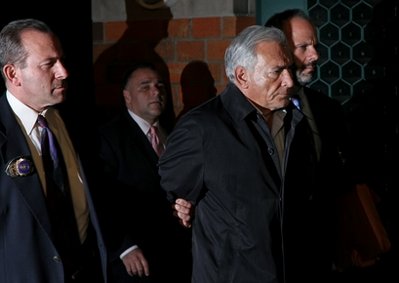Opinion
Strauss-Kahn's IMF future hinges on bail hearing
(Agencies)
Updated: 2011-05-19 09:33
 |
Large Medium Small |
WASHINGTON – Dominique Strauss-Kahn's bail hearing Thursday could spell the end of his leadership of the International Monetary Fund.
 |
|
In this May 15, 2011 file photo, Dominique Strauss-Kahn, head of the International Monetary Fund, is lead from a police station in New York. [Photo/Agencies] |
If a New York judge denies bail for Strauss-Kahn or imposes highly restrictive conditions on his freedom, the IMF's executive board would expect him to resign, two senior IMF officials said Wednesday. If he didn't, the board could remove him on the grounds that he couldn't lead the IMF from a jail cell or far from its Washington headquarters.
The two officials spoke on condition of anonymity because of the highly sensitive situation. Strauss-Kahn is jailed in New York City on charges of sexually assaulting a hotel maid.
Attempts to reach Strauss-Kahn's lawyers were unsuccessful. The Frenchman hasn't said whether he'll yield to rising international pressure for his resignation.
One of the IMF officials said the fund had yet to speak with its managing director since his weekend arrest. The IMF has appointed an interim chief, but there are no procedures for suspending or placing its leader on extended leave.
The other IMF official said the board will insist on a meeting after the court hearing. The board can remove Strauss-Kahn without cause, the official noted.
While Strauss-Kahn remains confined to a Rikers Island jail cell, the dividing lines are sharpening in a dispute over whether someone from a rich or an emerging economy should lead the IMF after his exit.
Europe is aggressively staking its traditional claim to the top position. But fast-growing nations such as China, Brazil and South Africa are trying to break Europe's grip on an organization empowered to direct billions of dollars to stabilize the global economy.
Europeans have led the IMF since its inception after World War II. Americans have occupied both the No. 2 position at the IMF and the top post at its sister institution, the World Bank. The World Bank funds projects in developing countries.
Europe has "an abundance of highly qualified candidates" to lead the IMF, German government spokesman Christoph Steegmans declared Wednesday. He also noted the relevance of having a European at the helm, to deal with the debt problems that have racked the eurozone.
Steegmans didn't name any potential candidates or say whether Germany might propose one. But German Chancellor Angela Merkel, along with the finance ministers of Sweden and the Netherlands, have pressed Europe's case for the IMF leadership.
Still, developing nations see Europe's stranglehold on the position as increasingly out of touch with the world economy. China's is now the world's second-largest economy. India's and Brazil's have cracked the top 10. Many emerging economies are sitting on stockpiles of cash and have become forces of financial stability, while rich countries have become weighed down by debt.
"We must establish meritocracy, so that the person leading the IMF is selected for their merits and not for being European," Brazilian Finance Minister Guido Mantega said, calling for a "new criteria" for leadership. "You can have a competent European ... but you can have a representative from an emerging nation who is competent as well."
China suggested it was time to shake things up at the IMF, with Foreign Ministry spokeswoman Jiang Yu saying the leadership "should be based on fairness, transparency and merit."
And South African Finance Minister Pravin Gordhan spoke in stronger terms. He said the new director should come from an emerging economy, to "bring a new perspective that will ensure that the interests of all countries, both developed and developing, are fully reflected in the operations and policies of the IMF."
It remains unclear which way the United States is leaning. Treasury Secretary Timothy Geithner said Tuesday that Strauss-Kahn is "obviously not in a position" to run the IMF, escalating the pressure on the 62-year-old economist.
The United States has a major say in determining who will head the fund, in part because it holds the largest number of votes. The prevailing view among analysts and former Treasury officials appears to be that Washington would back a strong European candidate who could be approved in a smooth process.
"It's kind of not our fight," said Phillip Swagel, a Treasury official in the George W. Bush administration. "There are very good reasons to have a forceful, prominent European head of IMF."
One such candidate would be French Finance Minister Christine Lagarde.
Other Europeans touted as possibilities are Germany's former central bank chief Axel Weber; the head of Europe's bailout fund, Klaus Regling; and Peer Steinbrueck, a former German finance minister.
Candidates from elsewhere include Turkey's former finance minister, Kemal Dervis; Singapore's finance chief Tharman Shanmugaratnam; and Indian economist Montek Singh Ahluwalia.
More possibilities include Trevor Manuel, South Africa's former finance minister; Mexico's central bank governor, Agustin Carstens; and former Brazilian central bank president Arminio Fraga.
Strauss-Kahn was removed from a plane Saturday at John F. Kennedy International Airport, moments before he was to fly to Paris. He was supposed to meet Sunday with German Chancellor Angela Merkel to discuss aid to debt-laden Greece and then join EU finance ministers in Brussels on Monday and Tuesday.
Strauss-Kahn's flight from Washington was paid for by the IMF, with an approved stopover in New York, the official said. That meant his New York visit was in a private capacity. He was not accompanied by security personnel or any IMF aides.
The official said Strauss-Kahn's security team was supposed to meet him at Paris' Charles de Gaulle airport. His assistants were already in Europe.
| 分享按鈕 |



